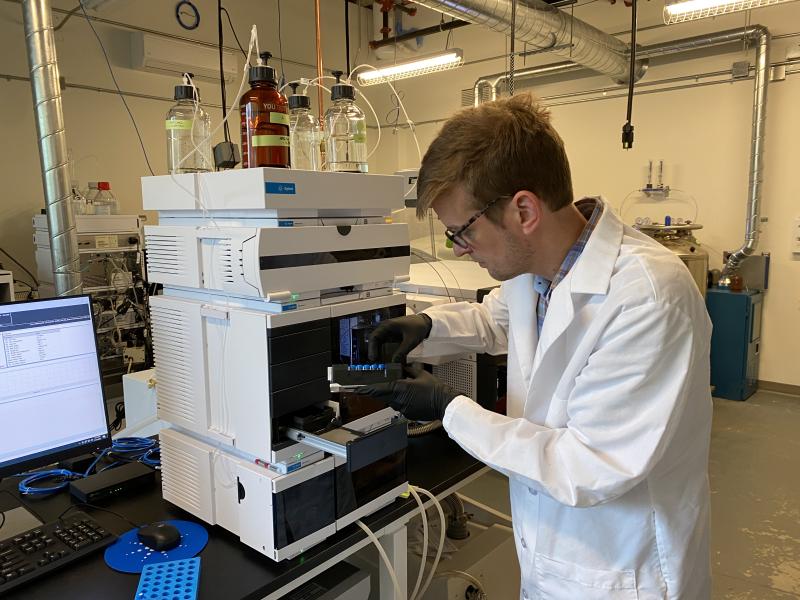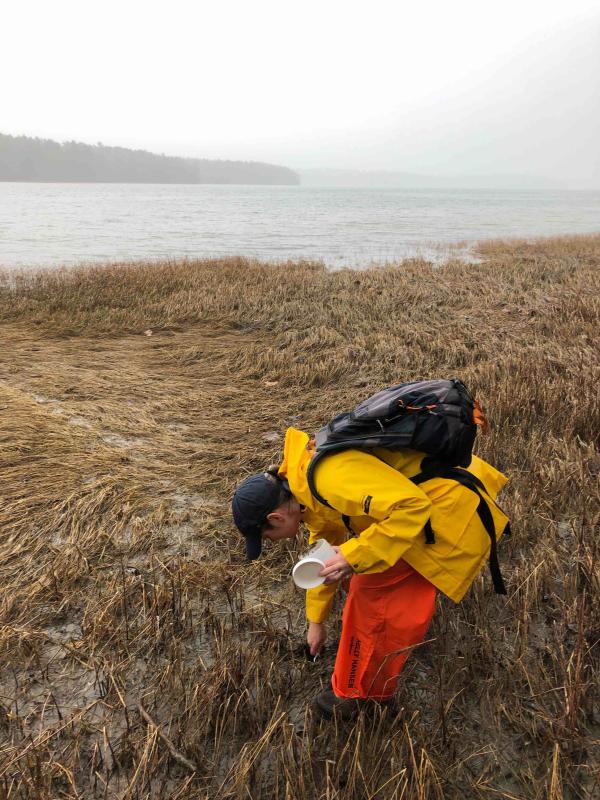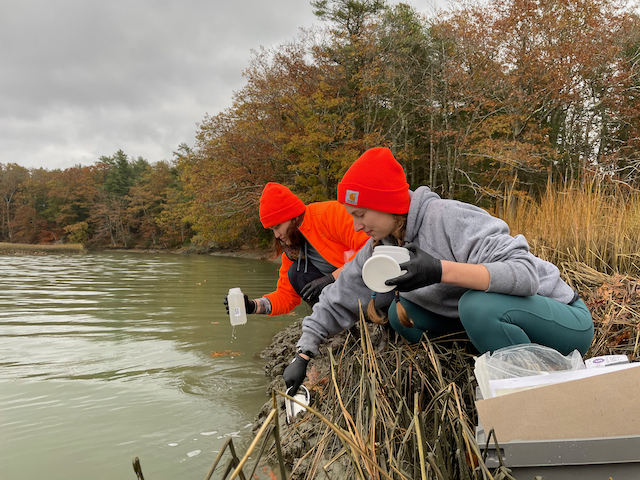Bigelow Laboratory launches new Maine-based testing services for PFAS
 Senior Research Scientist Christoph Aeppli, who directs new, state-certified testing services for PFAS at Bigelow Laboratory, uses a liquid chromatography-mass spectrometer in his lab to process samples. Collin Sheehan photo
Senior Research Scientist Christoph Aeppli, who directs new, state-certified testing services for PFAS at Bigelow Laboratory, uses a liquid chromatography-mass spectrometer in his lab to process samples. Collin Sheehan photo
 Bigelow Laboratory research staff collect samples of sediment, which is one of the mediums that Bigelow Laboratory can test for PFAS. Christoph Aeppli photo
Bigelow Laboratory research staff collect samples of sediment, which is one of the mediums that Bigelow Laboratory can test for PFAS. Christoph Aeppli photo
 Bigelow Laboratory research staff collect samples on the Maine coast to refine methods for determining the prevalence and types of PFAS chemicals. Courtesy of Bigelow Laboratory
Bigelow Laboratory research staff collect samples on the Maine coast to refine methods for determining the prevalence and types of PFAS chemicals. Courtesy of Bigelow Laboratory
 Senior Research Scientist Christoph Aeppli, who directs new, state-certified testing services for PFAS at Bigelow Laboratory, uses a liquid chromatography-mass spectrometer in his lab to process samples. Collin Sheehan photo
Senior Research Scientist Christoph Aeppli, who directs new, state-certified testing services for PFAS at Bigelow Laboratory, uses a liquid chromatography-mass spectrometer in his lab to process samples. Collin Sheehan photo
 Bigelow Laboratory research staff collect samples of sediment, which is one of the mediums that Bigelow Laboratory can test for PFAS. Christoph Aeppli photo
Bigelow Laboratory research staff collect samples of sediment, which is one of the mediums that Bigelow Laboratory can test for PFAS. Christoph Aeppli photo
 Bigelow Laboratory research staff collect samples on the Maine coast to refine methods for determining the prevalence and types of PFAS chemicals. Courtesy of Bigelow Laboratory
Bigelow Laboratory research staff collect samples on the Maine coast to refine methods for determining the prevalence and types of PFAS chemicals. Courtesy of Bigelow Laboratory
Bigelow Laboratory for Ocean Sciences has launched new analytical services, certified by the State of Maine, to test for per- and polyfluoroalkyl substances, more commonly known as PFAS or "forever" chemicals.
This family of over 10,000 synthetic chemicals has been widely used in consumer products for decades, but there is growing public concern over their potential health and environmental impacts. Bigelow Laboratory’s testing services will produce critically needed information on how PFAS behaves in the environment and increase testing capacity within the state for this poorly understood family of pollutants.
“This kind of testing is really complex, but we have the expertise and tools to manage it,” said Senior Research Scientist Christoph Aeppli, who is leading the new testing service. “We offer gold-standard, high-quality PFAS analysis, but we’re also able to customize the tests, adapt our procedures, and push the boundaries of the technology to help fill the testing gap in Maine.”
The new facility can test samples of water, sediment, soil, and plant and animal tissue using EPA-established methods to detect concentrations equivalent to a pinch of salt in an Olympic-sized pool. Bigelow Laboratory is one of just three labs in Maine certified to do this kind of analysis for state agencies; however, the services are available to any interested stakeholder. Currently, partners include tribal governments, public and private interest groups, and scientific peers looking to leverage the institute’s state-of-the-art equipment and expertise.
But Bigelow Laboratory aims to offer more than just a mail-in testing service. As an advanced research institute with significant experience in complex analytical testing, clients will have access to a broad array of services and specialized knowledge. They can work with the testing team to customize target chemicals, sample procedures, and detection limits based on their needs, and Aeppli and his team will expand the available services as research and technology in this relatively new field advances.
Clients will also get valuable context and guidance alongside the data to help them process and understand their results. They will have access to teams across Bigelow Laboratory for help with other potential issues, from organic pollutants like PCBs to biotoxins. This access includes experts within the Water Health and Humans Initiative who can help design an effective monitoring program that fits any particular concerns and resources.
“PFAS testing is still not straightforward, but being in this innovative research environment allows us to constantly push the technology forward and look at testing more holistically,” Aeppli said. “That puts us in a good position to address all manner of needs, no matter how complex.”
The new services will be invaluable for identifying potential issues in Maine’s environment — a first step toward promoting healthy water conditions and taking proactive measures to protect environmental resources. These services also will fill an important gap in capacity within Maine so agencies and local stakeholders no longer need to turn to out-of-state state laboratories that may cost more and lack nuanced local knowledge.
“With the recently released EPA drinking water standards for PFAS, there is going to be a lot of new testing needs for the state, and we’re here to help address those needs,” Aeppli said. “Our goal is to provide Maine residents and communities the data they need to make informed decisions.”
Learn more at bigelow.org, and join the conversation on Facebook, Instagram, and Twitter.







































